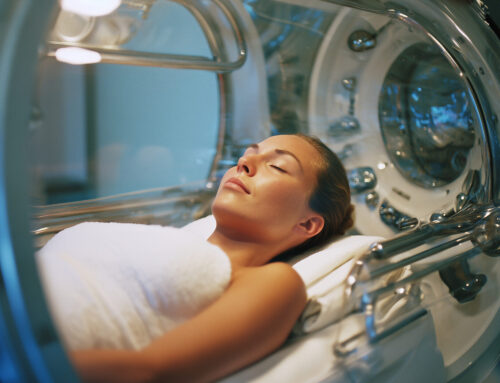Introduction
Inflammatory diseases that cause chronic inflammation and tissue damage are significant problems in modern medicine. Conventional treatment focuses on symptom management, frequently not addressing the underlying inflammatory processes. Hyperbaric Oxygen Therapy (HBOT) has become an adjunctive therapy for inflammatory diseases, a new way to modulate inflammation and promote tissue healing.
Inflammatory Bowel Disease (IBD) Deep Dive
Inflammatory bowel disease (IBD) represents certain chronic conditions that cause inflammation in the digestive system. Two of the most common forms of IBD are ulcerative colitis and Crohn’s disease. IBD can be debilitating and affect a person’s quality of life.
IBD Key Features
- Chronic Inflammation: IBD’s hallmark is chronic inflammation of the digestive tract, redness, swelling, and pain. The location and extent of inflammation varies depending on the type of IBD.
- Relapsing and Remitting: Doctors classify IBD as initial periods of activity (flare-ups) and periods of remission when the symptoms subside
- Sites Affected: Ulcerative colitis, or UC, affects only the colon and rectum. Crohn’s disease may involve any part of the GI tract – from the mouth to the anus.
- Age of Onset: IBD typically develops in young adults. Peak incidence is 15-30 years old but can occur at any age.
Symptoms
IBD symptoms may vary. Common symptoms include:
- Diarrhea: Frequent, loose stools, often with blood or mucus.
- Abdominal Pain and Cramping: These symptoms result from inflammation and GI tract ulcers.
- Blood in Stool: Can range from small amounts to visible blood.
- Weight Loss: Due to decreased appetite, malabsorption, and nutrient loss.
- Fatigue: Common symptom of chronic inflammation.
- Fever: During flares.
- Other symptoms include nausea, vomiting, joint pain, skin rashes, and eye inflammation.
Complications
IBD can lead to:
- Malnutrition: Inflammation can impede nutrient absorption and lead to malnutrition and deficiencies.
- Intestinal Obstruction: Scar tissue and strictures can block the intestines and require surgery.* Fistulas: Abnormal connections between intestines and other organs.
- Abscesses: Pockets of pus in the abdomen.
- Colorectal Cancer: IBD patients have an increased risk of colorectal cancer.
- Extraintestinal Manifestations: IBD can affect other organs, causing joint pain, skin problems, eye inflammation, and liver disease.
Causes and Risk Factors
Unknown but thought to be a combination of:
- Genetics: Family history of IBD.
- Immune System Dysfunction: Overactive immune system attacking the GI tract.
- Environmental Factors: Diet, gut bacteria, and infections.
Diagnosis
IBD diagnosis involves:
- Medical History: Detailed history of symptoms and family history.
- Physical Exam: Abdominal tenderness and other signs.
- Blood Tests: Check for inflammation and rule out other conditions.
- Stool Tests: Check for infection and blood.
- Imaging Tests: Colonoscopy, endoscopy, and MRI to visualize the GI tract and inflammation.
Treatment
IBD treatment controls inflammation, manages symptoms, and prevents complications. Options are:
- Medications: Anti-inflammatory drugs, immunosuppressants, and biologics may be used to target the immune system.
- Dietary Changes: Avoid trigger foods and a healthy diet.
- Surgery: Severe cases may require the removal of a damaged intestine or the creation of a stoma.
- Stress Management: Stress can worsen IBD symptoms, so stress management is essential.
- Support Groups: Connecting with others with IBD for emotional support and information.
What is HBOT and How It Can Help IBD
HBOT involves breathing 100% oxygen in a pressurized chamber, typically at 1.5 to 3 times atmospheric pressure. This increased oxygen concentration and pressure supersaturates the blood plasma and tissues with oxygen, leading to a cascade of physiological effects that can benefit patients with inflammatory diseases.
Mechanisms of Action
HBOT anti-inflammatory effects:
- Reduction of Pro-Inflammatory Cytokines: HBOT has decreased pro-inflammatory cytokines, key mediators of inflammation.* Anti-Inflammatory Cytokines: HBOT can stimulate the production of anti-inflammatory cytokines, which is a balanced immune response.
- Oxidative Stress: HBOT can reduce oxidative stress, which is a key player in tissue damage in inflammatory diseases.
- Angiogenesis: HBOT promotes new blood vessel formation, tissue oxygenation, and repair.
- Stem Cell Mobilization: HBOT can mobilize stem cells from the bone marrow tissue regeneration.
Case Study #1
Research featured in the journal Clinical Gastroenterology and Hepatology demonstrated the potential benefits of HBOT in patients with inflammatory bowel disease (IBD). HBOT was associated with reduced disease activity, improved mucosal healing, and decreased medication need.
Case Study #2
Another study at Northwestern Memorial Hospital has shown great hope in using HBOT to treat ulcerative colitis.
During the study, patients underwent HBOT for two hours daily for five consecutive days. During the sessions, patients could relax, listen to music, or watch movies. The study results were impressive, even exceeding the researchers’ expectations.
Patients who were just days away from major surgery to remove their colons due to severe ulcerative colitis experienced a dramatic improvement in their condition within the five-day HBOT treatment period. Their bleeding stopped, and their symptoms subsided.
Case Study #3
Another study on ulcerative colitis (UC) took place at UCLA. Two prospective randomized controlled trials, although limited in size, have indicated that administering HBOT to hospitalized UC patients experiencing acute moderate to severe flares can lead to higher remission rates and a reduced need for more aggressive treatments. This therapy includes biologics, small molecules, or colectomy during hospital stays.
Building on these findings, a larger research trial is underway. The new study is designed to support the positive outcomes observed in the previous trials.
_________________________________________
References – Case Studies
The Potential Role of Hyperbaric Oxygen Therapy in Patients With Inflammatory Bowel Disease
How Does Hyperbaric Oxygen Therapy Help Treat IBD? | Northwestern Medicine
Resources
Inflammatory Bowel Disease: An Overview of Immune Mechanisms and Biological Treatments – PubMed






